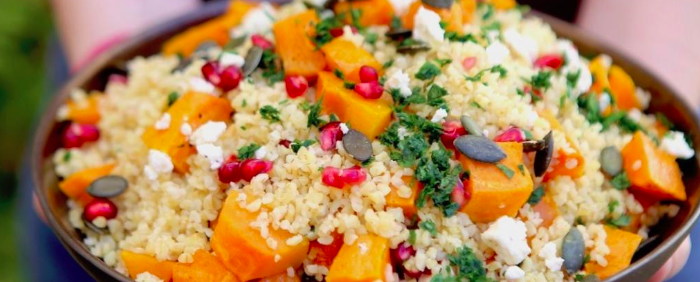
Nutritional value of bulgur
Here is the nutrient and mineral content of bulgur:
Boulghour: understand everything in 2 min
| Per 100 g | Bulgur, cooked |
| Carbohydrates | 18.6g |
| Fibers | 2.8g |
| Fat | 0.2g |
| Protein | 3.1g |
| Folic acid | 18 µg |
| Niacin | 1 mg |
| Iron | 1 mg |
| Potassium | 68 mg |
| Phosphorus | 40 mg |
| Magnesium | 32 mg |
| Zinc | 0.6 mg |
Effects of bulgur on health
Fibers
Bulgur is a source of dietary fiber, mainly insoluble . Fibers have different roles to play at the physiological level including the regulation of gastrointestinal function, the reduction of cholesterol levels as well as the management of glycemia (blood sugar level). They also contribute to the feeling of satiety which can help in weight management by reducing energy intake. There are also many, but not all, studies that claim that adequate fiber intake would protect against colon cancer.
Betaine
Bulgur is also a source of betaine, a compound that has shown anti-inflammatory effects in some scientific studies 3 . In addition, people who consume more betaine generally have lower homocysteine levels. Homocysteine is a marker related to cardiovascular disease, osteoporosis, Alzheimer’s and type 2 diabetes.
Bulgur glycemic index
The glycemic index (GI) is a scale that classifies foods rich in carbohydrates according to the increase in blood sugar compared to a reference food, either glucose or white bread. The higher the index, the more the consumption of this food causes the increase in blood sugar levels. There are several advantages to consuming foods with a low glycemic index, including controlling blood sugar and blood cholesterol levels, controlling appetite and reducing cardiovascular risk. A very rigorous review of the literature carried out in 2007 had also demonstrated that diets with a low glycemic index, compared to diets low in lipids, had better success rates in terms of weight loss 4 .
Bulgur has an average glycemic index of 55.
Use of bulgur
Bulgur can be cooked for cold dishes or salads by rehydrating it in boiling liquid (500 ml of water for 250 ml of bulgur) for 60 minutes and then draining. Its use in tabbouleh salad is well known. This salad of Lebanese origin contains, in addition to bulgur, parsley, tomatoes, mint, oil and lemon juice. It can also be served hot in casseroles or to replace rice as an accompaniment. To do this, cook the bulgur in boiling water (500 ml of water for 250 ml of bulgur) for 30 minutes on low intensity then add to the stews and pilaf. Cooked bulgur is also used in the stuffed vine leaves popular in Turkey.
Bulgur conservation
Bulgur should be kept in the refrigerator to delay rancidity and preserve vitamins and minerals. Once cooked, it can be stored 2-3 days in the refrigerator or in the freezer for 3 months.
A word from the nutritionist
|
Like all other cereal products, bulgur is a nutritious food to integrate for its content of B-complex vitamins and dietary fiber. Learn how to cook it for the variety and good nutty flavor it brings. |